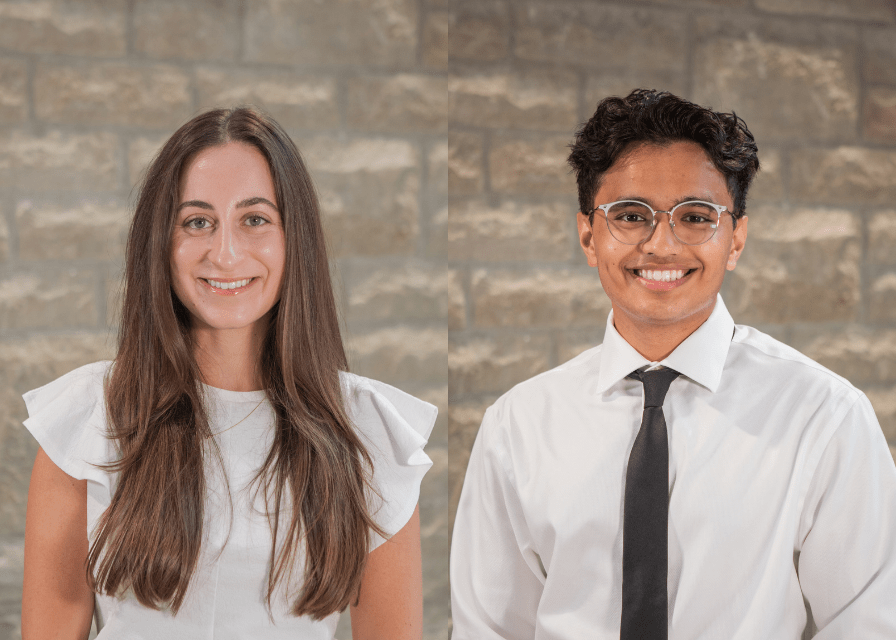The research we conduct at Niagara Health has a profound impact on the health and well-being of our patients and communities, and contributes to better understanding some of the most significant healthcare challenges of our time with the potential to benefit patients in Niagara and across Canada.

For Queen’s University medical students Bianca Marcella and Prey Patel, this summer was more than a chance to advance their research skills - it was an opportunity to come home.
Both raised in Niagara, they returned to the region through a Medical Student Research Studentship from Queen’s, which funds research opportunities for medical students. Each received a scholarship to spend the summer working on research projects with the Niagara Health Knowledge Institute (NHKI).
“Being able to come back and do research at Niagara Health felt like the best of both worlds,” says Marcella, who grew up in Niagara Falls and completed her undergraduate and master’s degrees at Brock University before heading to Queen’s.
“I could spend time with my family and friends while contributing to research that’s happening right here in my community,” she says.
For Patel, who also has deep roots in Niagara, the motivation was the same.
“I do want to go back and practice in Niagara,” he says. “That’s what motivated me to reach out to Dr. Jennifer Tsang, NHKI’s Executive Director and Chief Scientist about the studentship and to make sure I did my research in the community that I want to serve going forward.”
Research with real-world impact
Marcella’s project focused on improving the process of gaining consent for research in the Intensive Care Unit (ICU). In such high-stress environments, patients are often unconscious and family members are asked to make quick decisions about research participation.
“At Niagara Health, we worked on a project to summarize research in a concise one-page format, to replace a lengthy 10-page document,” Marcella explains. “We conducted a scoping review to see how the effectiveness of these types of tools has been measured in the past, and to help inform how this new tool could be tested here.”
She worked under the supervision of postdoctoral researcher Heather O’Grady, alongside undergraduate NHKI scholarship students.
“Heather was so supportive - we had weekly check-ins and she encouraged me to ask questions whenever I needed,” Marcella says. “It tied directly to what I had just learned in medical school about critically appraising research. This summer gave me the chance to put that into practice.”
Patel’s project explored a very different but equally patient-centered question: how passive music therapy could reduce anxiety and distress for patients with dementia in acute care settings such as the Emergency Department.
“When patients with dementia come to the ED, they’re often overwhelmed, and that can trigger emotional changes like anxiety or delirium,” he explains. “Music therapy, even something as simple as listening to a personalized playlist, can provide comfort in what feels like an uncontrollable environment.”
Like Marcella, Patel worked under O’Grady’s supervision.
“Heather really helped me get up to speed, since I joined a project that was already underway,” he says. “She taught me new frameworks for scoping reviews and supported me through everything from full-text extraction to manuscript writing. She was there every step of the way.”
Mentorship and support
Both students highlighted the mentorship they received from Niagara Health’s research leaders, particularly O’Grady and Dr. Tsang.
“Even before we met in person, Heather worked with me to pull my application together,” says Marcella. “I’m really grateful she took a chance on me.”
For Patel, the relationship has spanned several years.
“I started as a summer student with Dr. Tsang, then did my undergraduate thesis with her,” he says. “She’s always been so supportive - not just with research but even helping me prepare for my medical school interview. It showed me that Niagara Health values people beyond just the work they do.”
Looking ahead
Both students are entering their second year of medical school this fall, but they plan to continue collaborating with Niagara Health. Marcella will present her work at the Queen’s Medical Student Research Showcase, and her team will share their findings at the Critical Care Forum in Toronto this December. Patel hopes to continue his research remotely during the school year.
Most importantly, both see a future for themselves back in Niagara.
“I’d like to come home and work here,” says Marcella. “It’s exciting to see how much Niagara Health has grown in terms of research and to think about what the future might hold.”
Patel echoes that vision. “Research here has the dual purpose of advancing medicine and impacting the very community that raised me. That’s what makes it so meaningful.”

